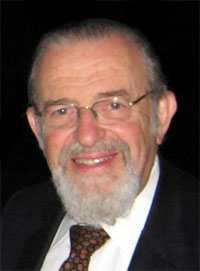There is an assumption that we control technology. We can use it for good or evil—to build or to wreck. We develop it, we manipulate it, we employ it to our own ends… but how often do we stop to consider that it too has influence, it too has power, and that as much as we think we control technology, it very much controls us?
In this week’s portion, Masei, there is a short discourse on the various materials an assailant might use to smite a victim. The first material is iron: “If he smote another with an instrument of iron, so that he dies, he is a murderer.” (Numbers 35:16) The second is stone: “If he smote with a stone in his hand, so that he dies, he is a murderer.” (35:17) The last is wood: “If he smote with an instrument of wood in his hand, so that he dies, he is murderer. (35:18)
The Sages point out that the description of violence executed with wood or stone differs somewhat from the description of violence executed with an object of iron. With wood and stone, the Torah mentions that the object be “in his hand.” But with iron no such stipulation is made. Based on this distinction, our Sages conclude that a person cannot be found guilty of murder if the wood or stone weapon used (in the attack) is less than the size of one’s hand. This contrasts with iron where “there is no minimum size, for even an iron object as small as a needle can be lethal.” (Sanhedrin 76b; Sifrei: 9)
What is remarkable about this teaching is that the rabbis of the Talmud stopped to consider the potency of each object. A splinter of wood might prick the skin, a pebble might loosen a tooth, but only a needle can pierce the heart or neck. An object, even a pin-sized one, requires us to understand not only what we can do with it, but what it can do to us.
I would like to finish with a bit of history. In the early 1900’s, the fountain pen began to replace the dip pen and inkwell. There were obvious advantages to the fountain pen. Its writing was smooth and fluid while the line made by a dip pen would vacillate from thick and blotchy to faded and thin. More importantly, with its internal ink cartridge, the user of a fountain pen could write at great length without refilling. In contrast, the dip pen ran dry after a line or so and needed to be continuously re-submerged.
For good reason, many young lawyers and businessmen quickly adopted these marvelous new pens. They could now write twice as much, twice as quickly; and behold, the missives multiplied like rabbits. But quite a few traditionalists clung to the inkwell, complaining to anyone who might listen: ‘Sure, they may write twice as fast, but without the pause between dipping and writing, they think a great deal less.’
Perhaps, it’s worth reflecting on this between the next email and text message: ‘Sure, we write twice as much and twice as quickly, but are we thinking a great deal less?’
Shabbat Shalom




